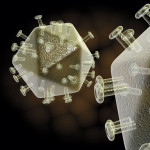When you read about cutting-edge gene-editing tools to fight HIV, it’s probably a reference to CRISPR/Cas 9 technology. But another, less commonly used type exists: CRISPR/Cpf1. Two scientists at the University of Massachusetts Medical School just received a grant from amfAR, The Foundation for AIDS Research to explore whether this other CRISPR technology can help eradicate the HIV reservoir.
As UMass Med Now reports, the three-phase grant goes to Jeremy Luban, MD, a professor of molecular medicine, and Scot Wolfe, PhD, a professor of molecular, cell and cancer biology.
When a person contracts HIV, the virus “acts essentially as a bad gene,” explains Luban. “It is a permanent member of the infected person’s genome, a permanent genetic element of your cells. CRISPR offers the possibility of removing it.” It does this by acting as a molecular scalpel that can cut specific genetic sequences from the DNA.
Most CRISPR technology is based on the Cas9 enzyme, but Luban and Wolfe are looking at the Cpf1 enzyme. The difference is that Cpf1 can target multiple sites on the genome. This could be a better choice for targeting HIV, the scientists say, because of how HIV mutates. Cpf1 can also produce larger deletions than Cas9.
For the first phase of the grant, funded at $200,000, the researchers aim to remove the HIV genome from a cell line. According to the UMass article, phase two would use primary human blood cells, and the third phase would advance to humanize mouse models.
For more POZ articles about this gene-editing tool, click #CRISPR.







1 Comment
1 Comment